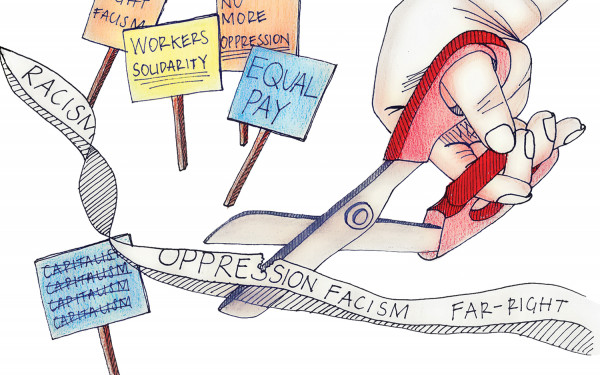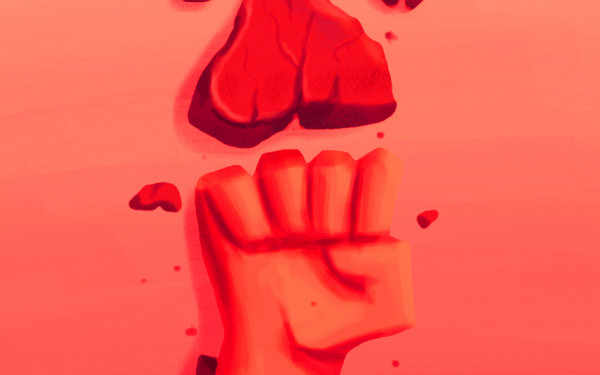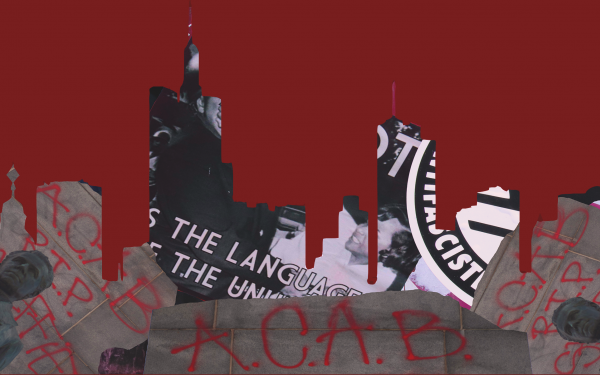Why the Police in Quebec Keep Ignoring the Far-Right
Fascism and Policing Go Hand in Hand
From its historic rise in the early 20th century to Quebec today, fascism and policing have always gone hand in hand.
The state’s sole purpose is to protect the privileges of certain peoples, and to protect the tools used by those people to achieve their goals of social and economic domination. Those tools include borders, infrastructure projects like Quebec’s Plan Nord—a 25 year economic plan launched by the province to invest $80 billion in energy, mining and forestry, and of course, the police. With that, it’s no surprise police in Quebec tend to ignore the threat of the far-right and have become complicit in its rise, since like the police, far-right groups favour hierarchical structures.
The police in Quebec, like all other police forces the world over, represent the interests of the state, and the interests of the wealthy and powerful. As a result, the rise of the far-right is of little concern to police officers in Quebec. Many police officers, on an individual level, are not in agreement with overt displays of fascism. Many might even hate fascism. On a systemic level, though, the fascistic rhetoric that runs throughout far-right groups is of no concern to police.
Recent events show this to be the case. On March 25, 2017, “Learn to Resist” workshops were being given at Concordia University by the Resist Trump & the Far-Right Network. The group formed in the context of Donald Trump’s rise to power and the rise of xenophobia and far-right reactionary politics in North America. Workshops were meant to open up a platform to begin anti-racist work in the city.
Lo and behold, racist individuals and far-right groups—the Canadian Coalition of Concerned Citizens and the Soldiers of Odin—learned of the event, and went to protest what they dubbed “terrorist workshops.” When it became clear that fascists (some were affiliated with groups which use Nazi iconography) were organizing to disrupt the workshops on that day, brave workshop-goers came out in front of the Hall building to defend themselves.To the surprise of few, Montreal’s police department came out to actively defend the reactionaries. Groups like Soldiers of Odin and Storm Alliance were able to march from the McDonald’s on Mackay St. to the Hall building. Were it not for the police officers actively walking and protecting these individuals, and aiming tear gas cannons at workshop-goers who opposed them, there’s no way that this would have happened.
Only a few weeks earlier, on March 4, racist reactionaries were able to take the streets in hundreds outside of Montreal’s city hall, under the pretext of defending “free speech.” Protesting M103—a motion by the federal government that condemned Islamophobia and encouraged the collection of data on hate crimes against Muslims—groups like La Meute were, thanks to the protection afforded to them by police officers, able to march down the streets practically unabated despite the significant push back of anti-fascist protesters.
The history of police forces implicitly, or even explicitly, defending fascist reactionaries goes back far and isn’t limited to Quebec. Fascist paramilitary groups in post-WW1 Europe contained several ex-military and police members. Today, it has come to light that the head of security for La Meute is a retired Quebec City police officer. Despite not explicitly calling themselves fascists, La Meute dog whistles to many far-right reactionary causes, pushing against so-called “illegal immigration” and the supposed Islamic menace.
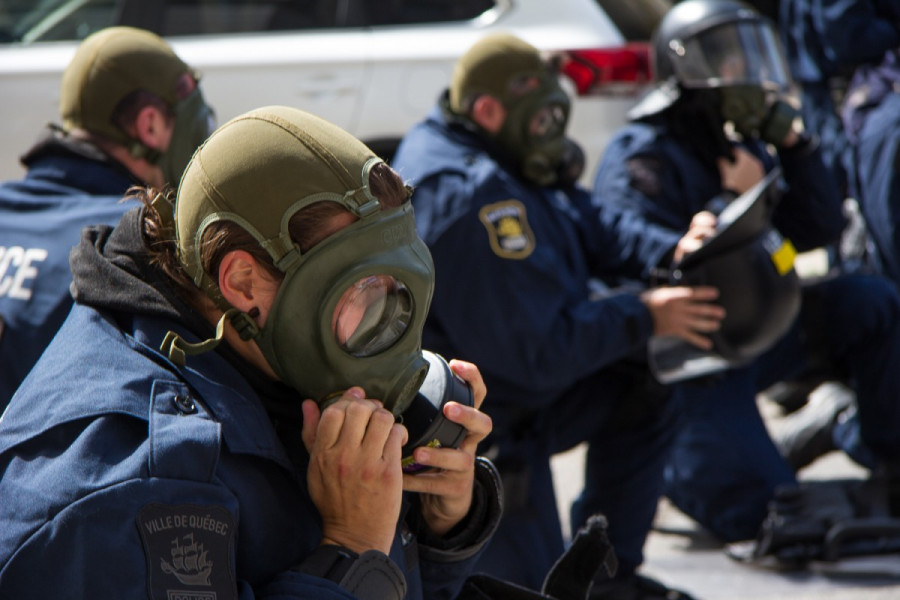
In a more disturbing escalation of events, some explicitly neo-nazi groups were allowed to march openly in the fall of 2017, in Quebec City proper by the National Assembly. The group Atalante Quebec, an explicitly fascist group that models itself both off fascist imagery of the early 20th century and more contemporary fascist movements like CasaPound Italia, covered enough ground in Quebec to actually have a proper banner drop and photo shoot on the walls of the old city.
Although a large contingent of anti-fascist activists came to counter those groups, which also included more known and popular far-right groups such as La Meute and Storm Alliance, their effectiveness on the ground was severely hampered by the active participation of the Service de police de la ville de Québec in supporting the far-right’s march.
Leading up to the march, the SPVQ was “in communication” with La Meute, supposedly to facilitate security for the march. This security that later allowed the far-right groups to march unabated and unchallenged throughout the day.
Police officers even arrested counter-protesters in large numbers; by the end of the day 44 were arrested. Despite it being well known and publicized that the SPVQ was in direct communication with La Meute in regards to the day’s events, the SPVQ later told The Link no records were kept of any of these exchanges between the police and La Meute or Storm Alliance.
This was all in the context of the rising far-right in a city which, earlier in the year, had to deal with the Islamophobic murder of several worshippers in a Quebec City mosque in January 2017. In August of the same year, La Meute was able to take to the streets and march “silently,” thanks solely to the role the SPVQ played in rooting out anti-fascist protesters who gathered to oppose them. Unsurprisingly, there were arrests of anti fascist protesters, and none on the side of La Meute.
The history of police forces implicitly, or even explicitly, defending fascist reactionaries goes back far and isn’t limited to Quebec.— Tessa Mascia
- * *
To understand contemporary police complacency in the rise of far-right and fascist organizing, it is important to first understand the system of policing today and what fascism is exactly.
Fascism is more than just “authoritarianism,” as many contemporary people mistakenly understand it to be. Fascism, essentially, is capitalism in decline. It is imperialism turned inwards. It is the bourgeois’ last grasp at maintaining its power in a given society.
The historic rise of fascism coincides with times of great economic depression in certain geographic areas. After complete national humiliation and economic depression following the end of the First World War, it should come as no surprise that populist right wing leader Adolf Hitler gained prominence in Germany. His authoritarian nationalism was more than a Hugo Boss aesthetic; despite his popular claims, Hitler directly represented the interests of the rich.
Without the consent of the powerful capitalist class in Germany, Hitler would never have been able to come to power. Other authoritarian far-right regimes that came to exist throughout the 20th and 21st centuries share similar roots—nations grant complete authority to the state to defend the interests of the few at the cost of the many.
Whether they are puppet regimes set up in the Americas by the bourgeois in other nation states, as was the case in Pinochet’s regime in Chile, or the result of decades of failed Western appeasement such as Erdoğan’s Turkey, fascistic authoritarian governments can only come to be in the context of global capitalism and the legitimization both of nation states and their monopoly on the “legitimate” use of violence.
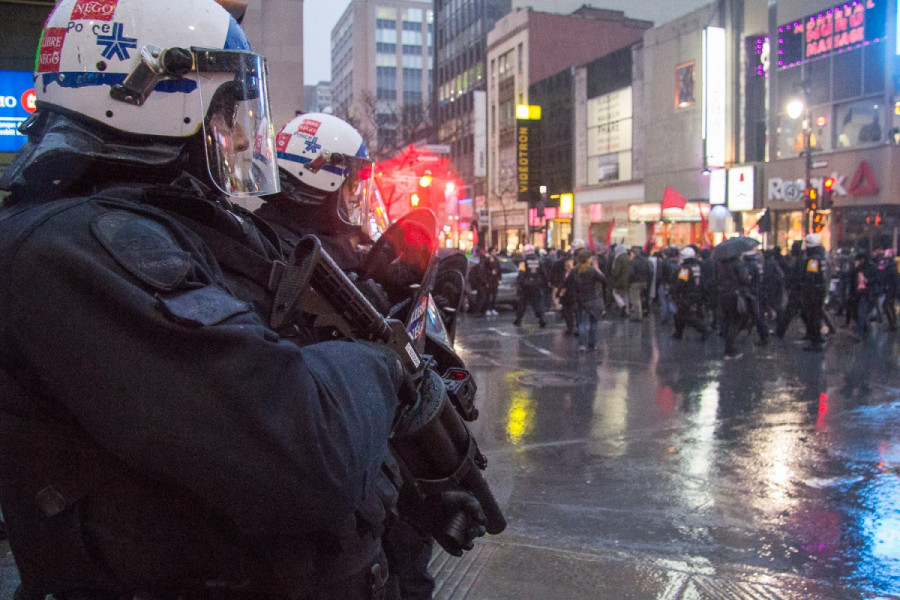
“All cops are bastards,” the saying goes.
As inflammatory as such a remark may be to more liberal-minded elements of society, it is less of a comment on the morality of individual police officers than a critique of the entire system of policing. Police, as we understand them, do not have their roots in some benign or even positive foundation to “serve and protect.” Police in the Anglosphere trace their roots back to medieval England, where sheriffs patrolled areas to collect taxes for the aristocracy.
In so-called America, the roots of policing are even more macabre, with slave patrols literally catching escaped humans to return to their supposed masters. In the period after the American Civil War, policing took on a new role with the onset of industrialization. This was especially true in the north, where police officers were called in to attack striking workers.
The horrors of early industrial America are well documented—child workers, long work days without breaks, and a pay not worthy of the work done. Unsurprisingly, workers rebelled against their bosses, forming militant unions and even what can loosely be described as workers militias to defend themselves. The contemporary bourgeois, bragging that “they could pay one half of the working class to kill the other half,” was unsurprisingly alarmed at workers’ solidarity as it directly affected their profits and, by extension, their power.
So, they fell back on the state to help defend themselves. Police acted as hired thugs to break strikes, kill union organizers, and defend scabs, who were often recent immigrants that had no idea what was going on in the factory they were being asked to work in. This was all done in order to break workers’ solidarity and maintain society’s uneven power structures.Despite what cringey police social media profiles will tell you, this is the role of police in the world—to maintain the current order that allows the rich owner class to benefit off the labour of workers. With the history of policing here in Canada, that’s not surprising, as the Royal Canadian Mounted Police was instrumental in maintaining colonial control on territories that had their natural resources extracted for profit for the state. And today, the Montreal police still maintain “order and control” in working class areas, as the police forces in Quebec act only as the strong armed thugs of the state of Canada, a state whose goal is to protect rich property owners.
The lesson here is as follows: Don’t rely on the state if you want to effectively combat the rise of the far-right. The police, as an extension of the state and one of the main perpetrators of its violence, exist only to maintain a set of given privileges in society. All that they do is follow orders from the higher ups.
It should come as no surprise that here in Quebec the police are complicit in the rise of the far-right. They allow them to march, they communicate in great detail, and some of them are even members of such groups.
Historically the lesson is much the same—cops support the state, no matter if that state is imperialist, colonial, authoritarian, or even explicitly fascist. If you want to stem and reverse the rise of the far-right, you’re going to have to build solidarity with other groups and individuals.
If you’re thinking of calling the cops, you might as well call up the reactionaries themselves.




_600_375_90_s_c1.JPG)
